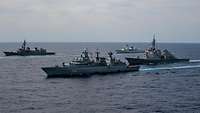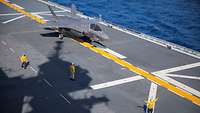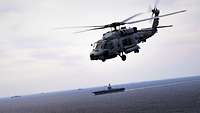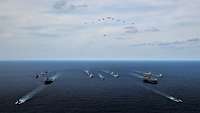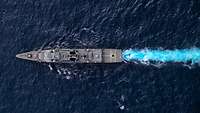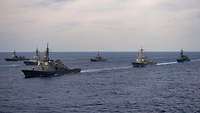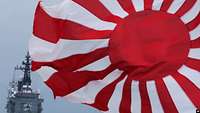Naval exercises: The “Bayern” at ANNUALEX 2021
Naval exercises: The “Bayern” at ANNUALEX 2021
- Date:
- Place:
- Rostock
- Reading time:
- 4 MIN
From 20 to 30 November, the German frigate took part in the annual large-scale exercise of the Japanese navy. For this exercise in the Philippine Sea, also the USA in particular, but Australia and Canada as well, had deployed warships.
The “Annual Exercise” series has been organised by the Japanese navy, formally Japan Maritime Self-Defense Force (JMSDFJapan Maritime Self-Defense Force), since 1996. Since then, the most important ally of the country, the United States, has generally been strongly represented with the exercise by vessels of the 7th USUnited States Fleet stationed in Japan. The aim is to strengthen the island nation’s naval partnerships and, in doing so, jointly improve the seafaring and maritime-military skills of all those involved – from the operational level down to the tactical working level.
This year’s major exercise has achieved this goal, according to Vice Admiral Hideki Yuasa, Japanese Fleet Commander. “Throughout ANNUALEX, the JMSDFJapan Maritime Self-Defense Force have improved our bilateral response capability and interoperability with the U.S. Navy,” he said, “as well as deepened our mutual understanding and cooperation with the Australian, Canadian and German navies.”
Right within the Indo-Pacific Deployment’s strategic context
This year more than 20 warships with more than 9,000 sailors and naval aviators were involved in the exercise. Host nation Japan provided around a dozen destroyers and frigates, led by helicopter carrier JS “Izumo”, plus at least one submarine. The USUnited States Navy provided the Carrier Strike Group 1 centred on aircraft carrier USSUnited States Ship “Carl Vinson”, including another submarine as well as two fleet tankers. From Canada and Australia, frigate HMCSHis/Her Majesty's Canadian Ship “Winnipeg”, destroyer HMASHis/Her Majesty's Australian Ship “Brisbane” and frigate HMASHis/Her Majesty's Australian Ship “Warramunga” were involved. There were also dozens of airplanes and helicopters participating.
“The USUnited States Navy is honored to be invited to participate once again,” said Rear Admiral Dan Martin, Commander of Carrier Strike Group 1. According to him, ANNUALEX presents an opportunity to strategically coordinate and further strengthen a network of partnerships and alliances, with the aim of remaining “a flexible, adaptable and persistent combined force capable of quickly projecting power, where and when needed.”
The German frigate was just one of many participants in the multinational naval exercise. Its involvement with ANNUALEX was embedded in an exceptional strategic context. According to experts, quantity and quality of military and especially naval training events in the Greater Region have increased significantly in recent years, especially in view of China’s military armament and its territorial ambitions. This year the program for the Japanese Navy alone included dozens of smaller and larger exercises.
“The invitation to ANNUALEX 2021 represents the operational highlight of ‘Bayern’’s deployment to the Indo-Pacific region,” said Commander Tilo Kalski, commanding officer of the German frigate. For the first time a German Navy vessel was involved in this particular exercise. Kalski explains: “Being the first German warship in nearly two decades to sail these seas, it is an enormous honour of having the opportunity to exercise with our partner navies within such an impressive maritime force.”
Well-known processes in the world’s largest ocean
In the first few months of its Indo-Pacific Deployment since the beginning of August, the German frigate had already carried out several individual exercises, called PASSEXes, with ships from partner navies. But on a much smaller scale: usually only with one or two other ships and for a duration of a maximum of one working day.
The exercise area for this ANNUALEX, the Philippine Sea, was located south of the Japanese Islands, north and east of the eponymous archipelago. With around 5.7 million square kilometres, this marginal sea is a good ten times the size of the North Sea – a good example of the spatial dimensions and distances that the “Bayern” has to deal with during its Indo-Pacific Deployment.
The exercise served to train the warships involved and their crews to work together as a naval task group to fight against targets above, on and under water. This time, one of the main focuses of ANNUALEX was to deepen abilities to defend against enemy submarines. The “Bayern” was therefore able to make an elementary contribution because it specializes in anti-submarine warfare – with her ship’s helicopters and sonar equipment.
“It was a confirmation of maritime capabilities of the ship and the crew,” says Commander Kalski, “They have proven their worth.” In addition to anti-submarine operations, the frigate was also involved in other serials of ANNUALEX, including replenishment-at-sea or general flight operations.
In the first row among Japan’s allies
“What was special for us was the high esteem we received from our Japanese comrades,” said Kalski. A so-called PHOTEX “emphasized this in an impressive way” at the beginning of the large-scale naval exercise. As a rule, warships in naval exercises undergo a specially planned opportunity, a so-called photographic exercise: they navigate closely together in a group in order to take a group photo of those involved from one of the on-board helicopters – as a souvenir, but also for public relations purposes.
“It was a special privilege for ‘Bayern’ to occupy a prominent position in the formation’s line-up," explains Kalski. His ship was allowed to lead the formation of the other twelve frigates and destroyers at the PHOTEX serial.


